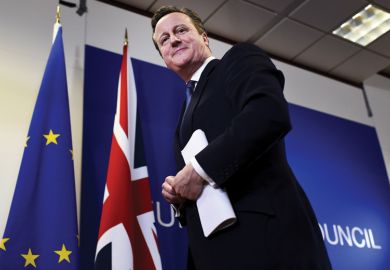UK universities will lose many more talented scientists to the US if voters opt to leave the European Union next month, the chancellor of the University of Oxford has warned.
In a stark warning over a potential brain drain, Lord Patten said UK universities would find it much harder to hire top young researchers without the excellent academic links made possible by the EU.
These links and opportunities for cross-border research gave a major advantage to the UK over the US, whose better-financed universities can generally offer far better salaries to top academics, explained Lord Patten, a former chairman of the Conservative Party.
Speaking at an event organised by Universities UK as part of its Universities for Europe campaign, Lord Patten warned that the “trend of postgraduates to go to the US would increase” in the event of the UK quitting the union.
“If you take away the research hinterland of the European Union, it would not be surprising if more young men and women went west,” he said.
He also ridiculed the notion that leaving the EU would free up more money for science and higher education.
According to claims by the Vote Leave campaign, in the event of Brexit the UK would no longer have to pay £350 million a week towards the union. However, said Lord Patten, “that £350 million a week is [pledged for] something different every week”. He added that this sum had been promised to the NHS, farmers and other causes by Vote Leave in recent weeks.
Ken Clarke, the former chancellor of the Exchequer and a leading pro-EU Tory, also spoke at the event held at Regent’s University London on 10 May.
He dismissed claims by the Vote Leave campaign that immigration rules in the event of Brexit might be made more favourable to higher education, allowing more highly skilled non-EU workers and fewer lower skilled EU nationals to enter the UK.
“The idea that if you give up the present access given to [EU] staff and students, you will get a free flow [of higher education workers] happening...is impossible,” he said.
Instead, academics from the EU would become entangled in the same “ridiculous visa situations” faced by non-EU academics who had approached him for help in his Nottingham constituency, said Mr Clarke.
He added that the “whole point of getting out of the EU” for the Vote Leave camp was to have “fewer foreigners here”.
Lord Winston, a Labour peer and Imperial College London professor, said leaving the EU would damage research collaborations with European universities, which generally produced better results than initiatives with partners in the US or Asia.
Speaking to Times Higher Education after the event, Lord Winston said his best work had been with European researchers, partly because their culture was more similar.
“These cultural things matter in the family environment of a scientific team,” he said. “It has always been easier to work with Europeans and much harder to work with Americans.”
Register to continue
Why register?
- Registration is free and only takes a moment
- Once registered, you can read 3 articles a month
- Sign up for our newsletter
Subscribe
Or subscribe for unlimited access to:
- Unlimited access to news, views, insights & reviews
- Digital editions
- Digital access to THE’s university and college rankings analysis
Already registered or a current subscriber?







